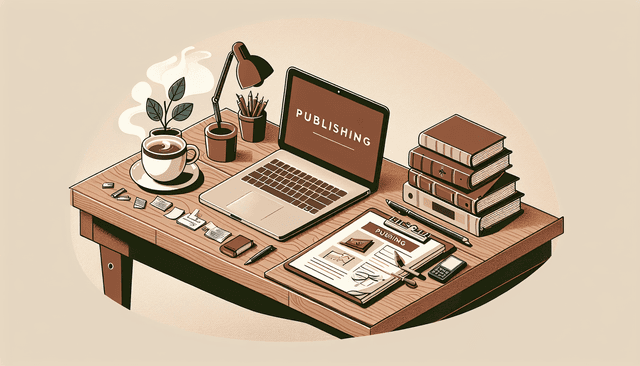Table of Contents
Starting a publishing company can feel like a daunting financial commitment. It’s easy to worry about how much you’ll need to invest just to get the ball rolling. Trust me, you’re not alone in feeling overwhelmed by all the numbers and expenses that seem to pile up.
But don’t fret! If you stick around, I promise we’ll break down all the costs involved in starting your dream publishing venture. From initial startup expenses to ongoing operational costs, we’ll cover everything you need to know to make informed decisions.
We’ll also touch on equipment, marketing, and even some clever tips to keep expenses in check. By the end, you’ll have a clearer picture of what it really takes to make your publishing dreams a reality!
Key Takeaways
- Starting a publishing company can require an investment between $5,000 to $20,000, depending on your publishing type.
- Key expenses include initial setup costs, legal fees, office equipment, and ongoing operational costs like salaries and marketing.
- Don’t overlook website creation, branding materials, and technology tools as crucial startup costs.
- Budget for marketing and promotion to effectively reach your audience through social media, events, and SEO.
- Legal fees are necessary for business registration, contracts, and copyright compliance to protect your venture.

Cost to Start a Publishing Company
Starting a publishing company is not just about passion for books; it requires a solid financial plan to turn that passion into a profitable venture.
First off, you need to understand that the costs can vary widely based on the type of publishing you choose, whether it’s traditional, self-publishing, or digital.
On average, budgets can start at around $5,000 for a low-scale operation, but it’s not uncommon for startups to invest $20,000 or more, especially when considering physical publishing.
Ultimately, it’s about knowing what you want to achieve and tailoring your budget accordingly.
Key Expenses in Starting a Publishing Company
Let’s talk about the major expenses you’ll need to plan for. One of the biggest costs will be your initial setup and product costs, which typically includes author payments, editorial fees, and printing costs.
Then there’s accounting and legal fees. Having a reliable accountant can save you headaches down the line, and investing in a good lawyer ensures you have proper contracts in place—especially if you’re working with multiple authors.
Don’t forget about office space or equipment. If you’re planning to work from home, you might only need a good computer and an internet connection, but renting office space will significantly increase your expenses.
Lastly, marketing should never be overlooked. It’s crucial to budget for outreach, advertisement, and promotional events, using both traditional and digital platforms to reach your audience effectively.
Initial Startup Costs
Initial startup costs can take a big bite out of your budget, especially for those who are keen on producing physical copies.
Costs such as ISBN purchases, website creation, and branding materials can add up faster than you think.
If you’re focused on print books, you’ll also need to consider cover design, interior formatting, and even a small initial print run.
On the flip side, if you’re leaning towards digital publishing, you can save a bundle, but you will still need costs for website hosting and eBook formatting.
Set aside a different budget for technology tools like project management software or cloud storage that can help streamline your operations.
Ongoing Operational Costs
Once you’ve launched, the expenses keep rolling in. Ongoing operational costs are things you’ll interact with daily, and they require careful consideration.
Salaries for staff, or freelance fees for editors, designers, and marketers, will significantly affect your budget.
Every month, think about website maintenance fees and subscription costs for various tools, like email marketing platforms and design software.
If you plan to publish regularly, consider booking recurring costs for printing and distribution, even if that’s just shipping books to authors.
Lastly, keep a close eye on sales and marketing costs, as you’ll always want to promote your newest releases. Think newsletters, social media ads, or even attending writer’s conventions to boost visibility.

Equipment and Software Costs
When you think about starting a publishing company, it’s essential to factor in costs for equipment and software.
A reliable computer is a must; consider investing in a high-performance machine that can handle graphic design software and editing tools.
In addition to hardware, you’ll need software for writing, editing, and design.
Programs like Adobe InDesign or Scrivener are popular choices for formatting and creating visually appealing books.
For collaboration and project management, tools like Trello or Asana can keep your team on track.
Don’t forget to budget for subscriptions to resources such as stock photo sites or proofreading tools like Grammarly or ProWritingAid.
And remember, investing in sound equipment for recording audiobooks is a great revenue option, so plan accordingly.
Marketing and Promotion Expenses
Next up, we need to discuss marketing and promotion expenses—these are crucial for getting your name out there.
Consider setting aside funds for creating a captivating website, as this will be the hub of your online presence.
Search engine optimization (SEO) can boost your visibility, so don’t skimp on this area; think about hiring a professional or investing in SEO tools.
Social media is your friend when it comes to reaching readers, so allocate a budget for paid ads or boosted posts on platforms like Facebook and Instagram.
Attending book fairs, conventions, and local events to network with potential authors and readers can also be beneficial.
Another smart move is to collaborate with book bloggers or influencers for reviews, which can help spark interest.
Legal and Licensing Fees
Every entrepreneur dreads the mention of legal fees, but they’re necessary to ensure your publishing company is compliant with regulations.
You’ll need to consider the costs of registering your business and potentially trademarking your name to protect your brand.
If you’re publishing works by other authors, having contracts that outline rights and responsibilities is essential; a good lawyer can help with this.
Additionally, don’t forget about licensing fees if you’re including any copyrighted materials in your publications.
Staying on top of copyright laws can save you from costly lawsuits down the road.
For detailed guidance, consider checking resources on how to get a book published for the first time; it often includes the legal aspects that are easy to overlook.

Funding Options for Your Publishing Company
When considering how to finance your publishing venture, you have several options.
Self-funding is often the easiest approach if you have the means, but you can also look into small business loans tailored for startups.
Crowdfunding platforms like Kickstarter or Indiegogo can help you raise funds while also gauging interest in your titles.
Another option is seeking angel investors who are passionate about literature and may want to support your vision.
Additionally, applying for grants specifically aimed at arts and publishing can provide non-repayable funds.
Whichever route you choose, be sure to have a solid business plan to present to potential investors or lenders.
Tips to Reduce Startup Costs
Starting a publishing company doesn’t have to break the bank if you take some smart steps.
Consider working from home to cut down on office space costs; you’d be surprised how much you can accomplish in your pajamas.
Outsource aspects like design or marketing only when necessary, and look for freelancers on platforms like Fiverr or Upwork for more budget-friendly options.
Use free software and tools initially—Google Docs, Canva, and others can help you get the job done for zero costs.
Barter services with fellow entrepreneurs; perhaps you can edit their manuscripts in exchange for design work.
Lastly, keep a close eye on your finances and review your budget regularly to identify areas where you can save.
Potential Revenue Streams for a Publishing Company
Having multiple revenue streams is crucial for the stability of your publishing business.
Book sales, whether physical or digital, are the primary income source, but think beyond just that.
Licensing your content for audiobooks or foreign translations can widen your audience and increase earnings.
Consider offering publishing services to other authors; things like editing, formatting, or consulting can generate additional income.
Hosting workshops or writing retreats can also attract aspiring writers willing to pay for your expertise.
Lastly, look into affiliate marketing by partnering with companies related to books—setting up links on your site can bring in added revenue.
Conclusion on Financial Considerations for Starting a Publishing Company
Launching a publishing company involves careful financial planning and awareness of your expenses.
From initial startup costs to ongoing operational expenses, understanding where your money will go is key to success.
Don’t overlook the importance of funding options and revenue streams as you lay the groundwork for your business.
With the right strategies, you can manage your costs effectively while also setting yourself up for profitability.
Remember, it’s not just about the love of books—it’s about creating a sustainable business model that can thrive in the competitive publishing landscape.
FAQs
The main costs include initial startup expenses such as equipment, software, license fees, ongoing operational costs, marketing and promotion, and unexpected legal fees. It’s essential to budget thoroughly to ensure all expenses are covered.
Funding options include personal savings, bank loans, crowdfunding, grants, angel investors, and partnerships. Each option has unique benefits and considerations, so evaluate them according to your business needs and vision.
To reduce startup costs, consider using open-source software, outsourcing specific tasks, starting small with limited titles, and leveraging social media for marketing. Careful planning can greatly minimize initial financial burdens.
Potential revenue streams include book sales (print and digital), subscription models, licensing deals, merchandise sales, and event hosting. Diversifying revenue sources can enhance stability and profitability for your business.



